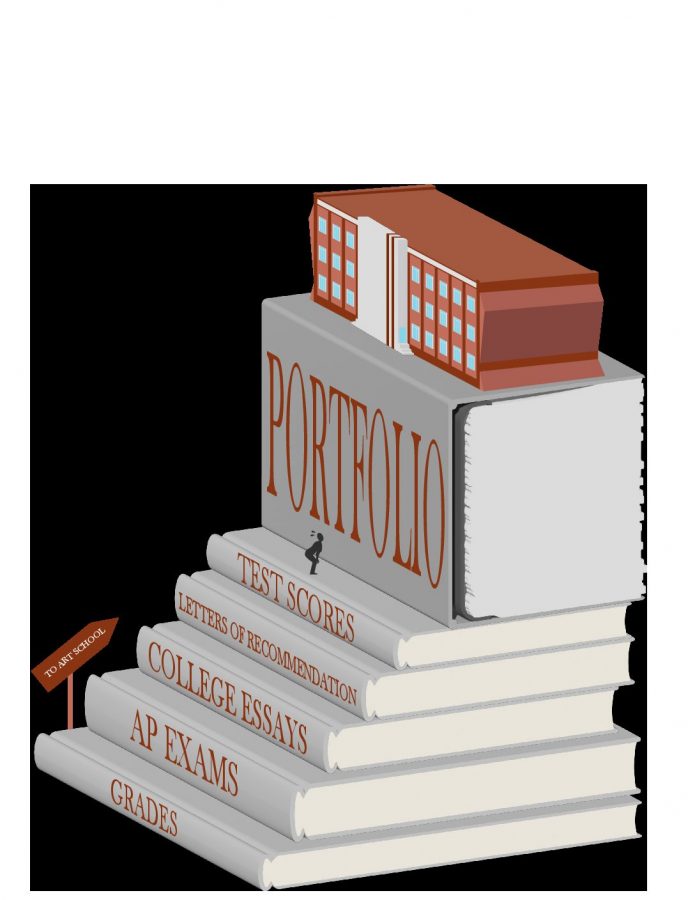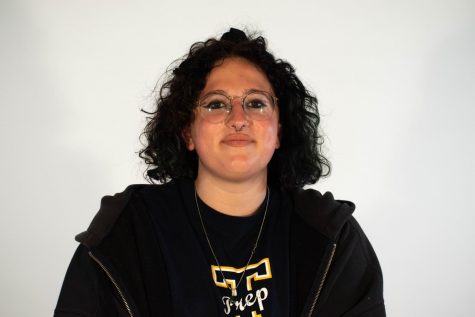We can all feel the tension as seniors rush around campus, desperately trying to make it through the day so they can go home and try to finish their college applications. There is a widespread awareness of the stress that comes with college applications, but the challenges faced by performing and fine arts students are often overlooked or even unknown entirely. Their applications don’t end with a Common App essay and lengthy supplementals but also include a portfolio portion and stressful interviews or auditions.
The resources Trinity has right now are good; knowledgeable teachers in almost every subject area and college counselors with a general understanding of the portfolio process. But, it could be better. If our college counseling department expanded to include a counselor specific to arts applications, it would be better for not only just the art students but all parties involved.
This topic hits very close to home. I have recently finished applying to college for stage management. It has been an incredibly tedious process with a ridiculous workload.
“[Bachelors of Fine Arts] programs require, it feels like, 10 times the amount of work because not only do you have to have an app and an essay for each college, then you have to have a separate portfolio, or audition . . . and separate essays for each school,” fine arts teacher Donna Walker said. “And on top of that, each school has different requirements.”
On top of all the additional work, students in many areas also face a decreased chance of acceptance. Carnegie Mellon University released acceptance rates for different departments. In 2020, the university as a whole had an acceptance rate of about 15%, but its School of Drama had by far the lowest acceptance rate, at only 4%.
The additional portion of my application required me to include a headshot and resume (both of which I did not previously have) as well as obnoxiously long writing samples for a couple of colleges and the dreaded portfolio. In short, this portfolio for stage management included everything I have written (blocking, props lists, set change sheets, light, sound cues, etc.) for every show I have stage-managed. As you can imagine, that is absolutely a nightmare to assemble, especially since I had virtually no direction as to formatting. Because of this lack of direction, I believe the school and college counseling would largely benefit from learning more about the needs of art students as a community to learn how they can better assist us.
“We are super open as a department to tell us how we can help you better,” college counselor Christine Grover said. “I’m hoping with individualized counseling that … the art students are feeling supported because everybody’s different. They have a different path.”
Senior Isabel Tongson has the unique major of dramatic writing. She and I are in a similar situation, as there is no teacher specific to scriptwriting or stage management. She mainly received help from Fine Arts Department Chair Janine Papin to help look over the plays she submitted in her portfolio.
“For a script writing portfolio, I included four different pieces ranging in size and genre to show the full breadth of my abilities plus a research paper I wrote using a critical feminist eye to demonstrate that I can thoroughly analyze works of writing in addition to creating them,” Tongson said.
Tongson said she lacked resources specific to her major because there have been very few scriptwriters from Trinity and no specific stage-writing teachers. Instead, she got advice from English, theatre and film teachers, but most of them were not certain about how to go about the process.
Sarah Suarez, a senior majoring in Music Therapy, received significant help from Fine Arts Teacher Christina Carter on the audition process and requirements.
“Every school has different requirements,” Suarez said. “Every school asks for one to four songs, and some require all or partially classical music. Some schools require pre-screen videos, which are videos that you have to submit before you get asked to audition in person. Also, some auditions also ask for you to show some music theory skills through sight-reading or improvisation. Also, many schools ask for an interview.”
Suarez, like many art students, needed to travel to complete her auditions. She received a lot of support from her counselor at TPS, but her application was still a very confusing process.
“I have an unconventional major and had pretty strong opinions on what kind of school I wanted to end up at, so my options ended up being pretty limited,” Suarez said. “Since music therapy is such a new and growing field, not many schools have it as a major. I had to do a lot of independent research and find all of the schools that had it as an undergrad basically on my own.”
For some schools, you need to be accepted into the school to even be considered for the arts program. Also, assuming that you need an interview, a lot of schools look at your portfolio and application first before they even offer an interview, so in those circumstances you need to make it through about three rounds of decisions.
“Going into this, I had no idea how to put together a portfolio, and I don’t think my counselors did either,” Tongson said. “Additionally, auditions and arts interviews take quite a bit of preparation depending on what the program asks for. Students often have no clue what is going to make them stand out, so they rely on those who have gone through the arts application process to give them pointers.”
Many students have no prior knowledge of the portfolio process. Not only is there a limited capacity of knowledge given to the prospective fine art majors about the process, there’s also no way for them to gauge talent.
“While we’re excellent at the logistics of helping you guys get the applications out, get them early, follow the deadlines, I will never be somebody who can say like, this person’s talented enough,” Grover said. “So I think that makes it tougher for you guys, if you don’t have somebody who can look at your work and say, this is good enough, because it’s talent-based, right? So it’s much tougher to put that art students into likely, probable, and reach.”
Senior Hannah Yared is planning to minor in art. She was assisted in selecting pieces for her 3D art portfolio and building her resume by Fine Arts teacher Vadim Malkin during as well as outside of class. In addition, college counseling helped in proofreading her artist statement.
Yared’s art teachers were able to help because they most likely went through a similar process to major in the area they teach in. However, she thinks the school would benefit from an art counselor specializing in applying to an art major or creating art portfolios.
“College counselors aren’t usually very prepared to deal with the arts as much as all the other things,” Malkin said.. “I think it’d be nice if they had more knowledge of art schools.”
Although many students major in the arts, their assistance from teachers are often overlooked, unappreciated and (more importantly) uncompensated.
“This is not something that I’ve been specifically contracted or compensated from the school for,” Walker said. “We could definitely use some assistance.”
Senior Katie Wright is majoring in screenwriting but submitted an optional portfolio for photography. She said she didn’t receive help from teachers as far as the photo selection process went. However, she found college counseling to be helpful and knowledgeable in walking her through all the processes for her major. At the same time, she agrees that more resources could be beneficial.
“I absolutely think that there should be more knowledge, help, and resources to help kids that are trying to go to college for the arts,” Suarez said. “There are only a few of us and I know we have all somewhat banded together in our struggle and stress. I feel like my counselor has done all that he is really able to do, and the rest was really left up to me. I wish there was more support and ways that we could talk to someone that specializes in arts applications, since they are so much more competitive.”
The main thing to focus on is that there are many ways we can build upon the systems that are already in place.
“I think that we need to be able to identify anyone who’s interested in doing a BFA program, so that we can work in tandem with the college counseling office,” Papin said.
Adding an extra counselor would lighten the workload of counselors and teachers trying to assist with portfolios. The school would also benefit from more arts acceptances into more prestigious universities. As more and more students are exploring arts majors, this could be a really great move for the school to show how vital the arts are to the image of our school as a whole. In addition to classes and help from teachers, we also have college counseling. One of the biggest things to keep in mind is that these counselors aren’t going to track down artists to get them to go to the events the school offers. Therefore, we all need to be proactive in learning about what college counseling offers to take advantage of everything available.
“Last year, we had an athletic recruitment night,” Grover said. “And this year, we have a night for the arts. And it’s open to all the students at Trinity and have like some of the best art schools and admissions and what they’re looking for. I’m hoping as the campus opens up this spring, when the university reps come to visit, from everywhere, when the reps come, because they’re the ones looking at your portfolios. They come with a lot of expertise, so I’m hoping we can provide you with that expertise a little more.”









